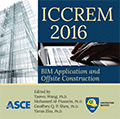International Conference on Construction and Real Estate Management 2016
An Appraisal of the Efficiency of Local Tax Administration in Nigeria
Publication: ICCREM 2016: BIM Application and Off-Site Construction
ABSTRACT
This research appraises the efficiency of tax administration in Nigeria from 2000–2012. It focuses on Federal Inland Revenue Service saddled with the responsibility of federal tax administration in Nigeria. The research was conducted using an ordinary least squares (OLS) technique of multiple regression models using statistical time series data from 2000–2012. The estimated result shows a positive relationship between the dependent variable (real gross domestic product) and the independent variable (government taxes). The regression result shows that tax was not properly signed and this could largely be credited to poor tax administration in Nigeria and over dependence of government on earnings from crude oil in funding her projects. The results also show a significant relationship between targeted tax revenue. Based on the results, it was therefore suggested that there should be sustenance and strengthening of tax reform, improved legal system, and proper deployment of tax nets to tap untapped resources and capture neglected sector.
Get full access to this chapter
View all available purchase options and get full access to this chapter.
REFERENCES
Agbetunde, L.A. (2010). Principles and practice of Nigerian personal income tax, 2nd ed, ELToda Venture Ltd, Lagos.
Andreoni, J., Erard, B. and Feinstein, J. (1998). “Tax compliance.” Journal of Economic Literature, 36(2), 818–860.
Ariyo, A. (1997). Productivity of the Nigerian tax system: 1970–1990. African Economic Research Consortium (AERC), Nairobi, Kenya.
Ayua, I.A. (1996). The Nigerian tax law, Oyo Spectrum Law Publishing, Ibadan.
Howard, M. (2001). Public sector economics for developing countries. University of the West Indies Press, Kingston.
Ilegbinosa, I.A. (2013). “An appraisal of fiscal policy measures and its implication for growth of the Nigerian economy: 1970–2009.” Advances in Management & Applied Economics, 3(4), 193–204.
James, A. and Moses, A. (2012). “Impact of tax administration on government revenue in a developing economy: the case of Nigeria.” Journal of Business and Social Science, 3(8), 33–43.
Kiabel, D.B. and Nwokah, G.N. (2009). “Boosting revenue generation by state governments in Nigeria: the tax consultant option revisited.” European Journal of Sciences, 8(4), 532–539.
Lopez, A. and Kadar, Z. (2001). “Introduction.” <http://proquest.umi.com/pqdweb?index=118did=89500950SrchMode=1sid=2Fmt=3VInst=PRODVType=PQDRQT=309VName=PQDTS=1272359779clientId=27520.> (Apr. 27, 2015).
Lymer, A. and Oats, L. (2010). Taxation policy and practice (16th edition), Fiscal Publication, Birmingham.
Miller, A. and Oats, L. (2009). Principles of international taxation (2nd edtion), Tottel Publishing, West Sussex.
Ngerebo, T.A. and Masa, A. (2012). “Appraisal of tax system in Nigeria: a case study of Value Added Tax.” Research Journal in Organizational Psychology & Educational Studies, 1(6), 338–344.
Nightingale, K. (2002). Taxation theory and practices (4th edition), Pearson Education Ltd, London.
Odusola, A.F. (2006). “Tax policy reforms in Nigeria.” General Information, 48(6), 466–476.
Ogbonna, G.N. and Appah, E. (2012). “Impact of tax reforms and economic growth of Nigeria: a time series analysis.” Current Research Journal of Social Sciences, 4(1), 62–68.
Osoro, N.E. (1993). Revenue productivity implications of tax Reforms in Tanzania, African Economic Research Consortium, Nairobi.
Rosen, H.S. (2004). Public finance, McGraw-Hill/Irwin, Boston.
Tanzi, V. (1987). Quantitative characteristics of the tax systems of developing countries, Oxford University Press, New York.
Tanzi, V. (1992). Structural factors and tax revenue in developing countries: a decade of evidence, Cambridge University Press, Cambridge.
Tennant, S. and Tennant, D. (2007). “The efficiency of tax administration in Jamaica: an introspective assessment.” Social and Economic Studies, 56(3), 71–100.
Information & Authors
Information
Published In
ICCREM 2016: BIM Application and Off-Site Construction
Pages: 770 - 781
Editors: Yaowu Wang, Ph.D., Professor, Harbin Institute of Technology, Mohamed Al-Hussein, Ph.D., Professor, University of Alberta, Geoffrey Q. P. Shen, Ph.D., Professor, The Hong Kong Polytechnic University, and Yimin Zhu, Ph.D., Professor, Louisiana State University
ISBN (Online): 978-0-7844-8027-4
Copyright
© 2017 American Society of Civil Engineers.
History
Published online: Aug 14, 2017
Authors
Metrics & Citations
Metrics
Citations
Download citation
If you have the appropriate software installed, you can download article citation data to the citation manager of your choice. Simply select your manager software from the list below and click Download.
